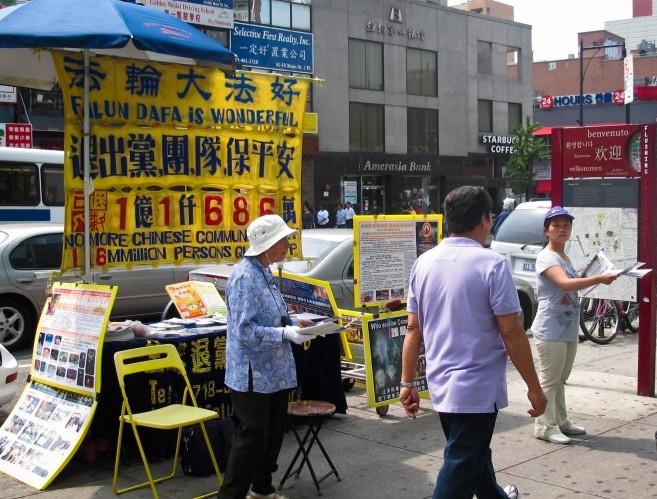NEW YORK—Sweaty crowds make their way through Main Street, Flushing, walking past yard sales, whole roasted ducks hung behind windows, and teenagers slurping tapioca drinks. Amid the crowd stands a small 80-year-old woman, offering to tell her story to passersby.
She has come to stand at this site five days a week, every week since 2005, rain or shine.
“I can’t stand for as long as I used to, but I feel that it is important to do this,” she said.
Her name is Jian-Sheng Feng. She’s a volunteer at the Global Service Center for Quitting the Chinese Communist Party in Flushing, where a large Chinese population resides.
Feng lived through the brutality of the Great Leap Forward, the Cultural Revolution, and the Tiananmen Square massacre.
But in looking back on the history of the Chinese Communist Party (CCP), she begins to cry as she remembers the Party’s most recent campaign—its persecution of Falun Gong (also known as Falun Dafa).
In December 2000, Feng was arrested for her belief in Falun Gong, a spiritual practice based on the principles of truthfulness, compassion, and tolerance. The head of the CCP at that time, Jiang Zemin, began a campaign to “eradicate” the practice, fearing its popularity and the appeal of its teachings.
In prison, Feng—68 at the time—was forced to do intense physical labor during the day. During winter nights, she slept on clay floors without blankets while prison guards poured buckets of ice water on her so that she could not sleep.
She was fed two meager meals a day, and force-fed unknown substances. “We were in the same jail as murderers and rapists, but even they were fed better than us,” she said.
After she became a refugee in the United States, she said it was her duty to let the Chinese people know what really goes on in China, behind the facade of state-run media reports. That is why she volunteers at the headquarters of the Global Service Center.
There are over 100 volunteer service centers like this outside of China. The organization is volunteer-run and privately funded. Their grass-roots movement is known as “tuidang” in Chinese.
It helps people withdraw from the CCP and its affiliated organizations. After a tuidang statement is received, it is published on the Quitting the CCP website.
The movement began in 2004, after The Epoch Times published the “Nine Commentaries on the Communist Party.”
The “Nine Commentaries” is an editorial series that was republished as a book. It provides an uncensored account of the nature of the CCP and its history of violence and lies.
The series spread to mainland China via fax, email, and mail, leading to a large response from Chinese readers who wanted to renounce their ties to the CCP and its affiliated organizations, such as the Youth League and the Young Pioneers.
Last year, the number of people who have disavowed their affiliations with the CCP reached over 100 million.
“These 100 million include people of all social strata, from the top, such as military personnel and government officials, all the way to the lower strata, such as villagers and students, crossing all social classes,” said Yi Rong, chairwoman of the New York-based Global Service Center at a press conference in 2011.
Re-Jing Mi, a 50-year-old volunteer at the Global Service Center, said that being a part of the CCP means giving one’s freedom, one’s power to make decisions, and one’s life to the Party.
“Think about it, the most precious thing a person can have is their life, isn’t it?” she said. “That’s why I’m here to help people quit the Party.”
In March 2010, the U.S. Senate unanimously passed Resolution 232, co-sponsored by Robert Menendez (D-N.J.) and Tom Coburn (R-Okla.). The resolution supports the tuidang movement and calls for an end the persecution of Falun Gong.
Next...Reaching Out to a New Group of Chinese






